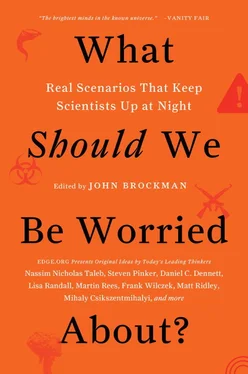And spectrum disorders are just the most visible evidence of neural breakdown. We must also consider the extensive use of SSRIs and other mood-enhancement drugs. Unlike psychedelics and other psychosocial learning substances, SSRIs were designed for continuous use. By treating stress, anxiety, and even transient depression as chronic conditions, the doctors prescribing these medications (influenced by the companies peddling them) are changing people’s neurochemistry in order to dampen their responses to real life. The fact that 23 percent of American women between the ages of forty and fifty-nine take SSRIs may have less to say about this group’s propensity for depression than it does about the way our society currently responds to women between forty and fifty-nine. To drug the victim may be merciful on some level but only paralyzes our collective self-regulation as a culture and a species.
So on the one hand, we should be worried about a future in which there are only a few of us left to keep the lights on, caring for a huge population of neurally-challenged adults. We are seeing the beginnings of this in a media-influenced society of imbecilic beliefs, road rage, and inappropriate reactions to stimuli. The reasonable people, on whom we depend for restaurants, hospitals, and democracy itself to function, seem to be dwindling in numbers, replaced by those with short tempers, inferiority complexes, and an inability to read basic social cues. On the other hand, if all this bothers us, we’re supposed to take medication to alter our perceptions of and responses to social phenomena that should rightly make any healthy person depressed. And the number of people who have chosen to pharmaceutically limit their emotional range should be a concern—because they are no longer bearing witness to our collective reality. There are fewer of us left alarmed enough to take the action necessary.
Not to mention that all these drugs end up in the water supply and beyond, likely leading to increases in spectrum disorders among children. (Taking SSRIs during pregnancy, for instance, leads to double the probability of delivering a child on the autism spectrum.) So we come full circle, increasingly incapable of doing anything about this feedback loop, or even caring about it. We’re soaking in it.
But there’s an even greater concern. We should worry less about our species losing its biosphere than losing its soul. Our collective perceptions and cognition are our greatest evolutionary achievement. This is the activity that gives biology its meaning. Our human neural network is in the process of deteriorating and our perceptions are becoming skewed, both involuntarily and by our own hand. And all that most of us in the greater scientific community can do is hope that somehow technology picks up the slack, providing more accurate sensors, faster networks, and a new virtual home for complexity.
We should worry that such networks won’t be able to function without us; we should also worry that they will.
ALISON GOPNIK
Professor of psychology, UC Berkeley; author, The Philosophical Baby: What Children’s Minds Tell Us About Truth, Love, and the Meaning of Life
Thinking about children, as I do for a living, and worrying go hand in hand. There is nothing in human life so important and urgent as raising the next generation, and yet it feels as if we have very little control over the outcome. British prime minister Stanley Baldwin once accused the press of having “power without responsibility—the prerogative of the harlot throughout the ages.” Perhaps it’s appropriate that the prerogative of the mother is just the opposite of the harlots: We moms have responsibility without power, a recipe for worry if ever there was one. But as a scientist as well as a mother, I worry that much of our current worry about children is misdirected. We worry a lot about the wrong things, and we don’t worry nearly enough about the right ones.
Much modern middle-class worry stems from a fundamentally misguided picture of how children develop. It’s the picture implicit in the peculiar but now ubiquitous concept of “parenting.” As long as there have been Homo sapiens, there have been parents. Human mothers and fathers, and others as well, have taken special care of children. But the word “parenting” first emerged in America in the 20th century and became common only in the 1970s. This particular word comes with a picture, a vision of how we should understand the relations between grown-ups and children. “To parent” is a goal-directed verb. It describes a job, a kind of work. The goal is to shape your child into a particular kind of adult—smarter or happier or more successful than others. And the idea is that some set of strategies or techniques will accomplish this. So contemporary parents worry endlessly about whether they are using the right techniques and spend millions of dollars on books or programs that are supposed to provide them.
This picture is empirically misguided. “Parenting” worries focus on relatively small variations in what parents and children do—co-sleeping or crying it out, playing with one kind of toy rather than another, more homework or less. There is very little evidence that any of this makes much difference to the way children turn out in the long run. Nor does there seem to be any magic formula for making one well-loved and financially supported child any smarter or happier or more successful as an adult than another.
The picture is even more profoundly misguided from an evolutionary perspective. Childhood is one of the most distinctive evolutionary features of human beings; we have a much longer childhood than any other primate. This extended childhood seems, at least in part, to be an adaptation to the variability and unpredictability of human environments. The period of protected immaturity we call childhood gives humans a chance to learn, explore, and innovate without having to plan, act, and take care of themselves at the same time. And empirically we’ve discovered that even the youngest children have truly extraordinary abilities to learn and imagine, quite independent of any conscious parental shaping. Our long protected childhood arguably enables our distinctive human cognitive achievements.
The evolutionary emergence of our extended childhood went hand in hand with changes in the depth and breadth of human care for children. Humans developed a triple threat when it comes to care. Unlike our closest primate relatives, human fathers began to invest substantially in their children’s care; women lived on past menopause to take care of their grandchildren; and unrelated adults—“alloparents”—kicked in care, too. In turn, children could learn a variety of skills, attitudes, knowledge, and cultural traditions from all those caregivers. This seems to have given human children a varied and multifaceted cognitive toolkit that they could revise and refine to face the various unpredictable challenges of the next generation.
So the evolutionary picture is that a community of caregivers provides children with two essential ingredients allowing them to thrive. First, adults provide an unconditionally nurturing and stable context, a guarantee that children will be safe and cared for. That secure base frees them to venture out to play, explore, and learn—to shape their own futures. Second, adults provide children with a wide range of models of acting in the world, even contradictory models of acting. Children can exploit this repertoire to create effective ways of acting in unpredictable and variable environments—and eventually to create new environments. This is very different from the “parenting” picture, where particular parental actions are supposed to shape children’s adult characteristics.
Читать дальше












